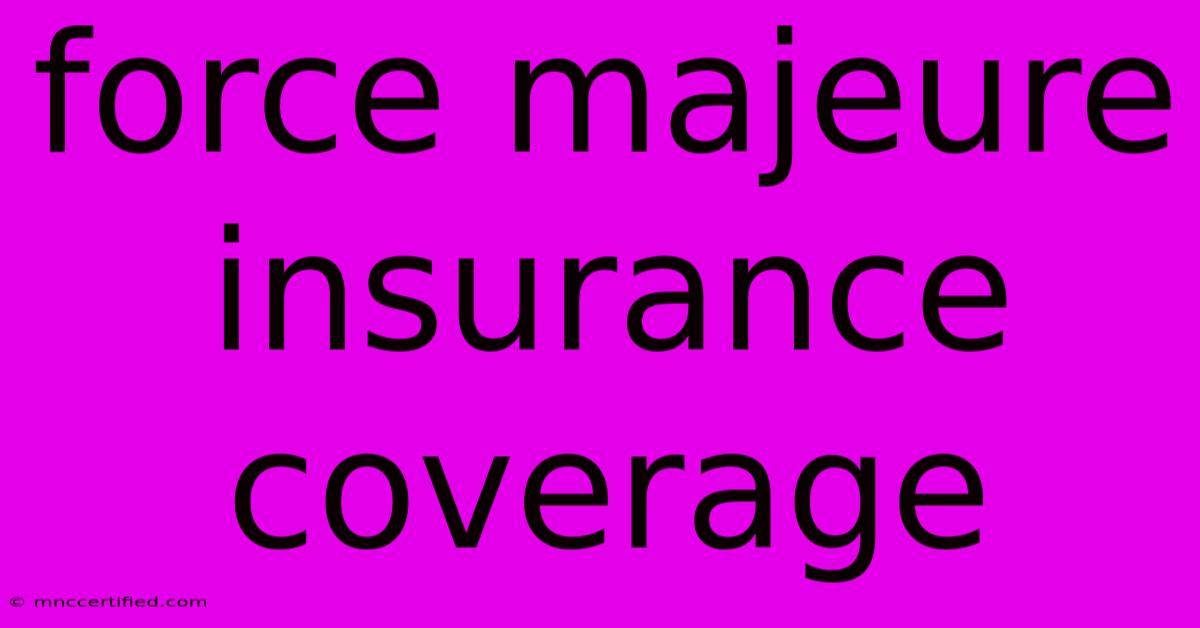Force Majeure Insurance Coverage

Table of Contents
Force Majeure Insurance Coverage: Navigating Unforeseeable Events
Force majeure, a French term meaning "superior force," refers to an unexpected and uncontrollable event that prevents a party from fulfilling its contractual obligations. While force majeure itself isn't insurable, the consequences of a force majeure event often are. Understanding what's covered and what isn't under your insurance policy is crucial for mitigating financial losses during unforeseen circumstances. This article will explore force majeure insurance coverage, highlighting key considerations and frequently asked questions.
What Does Force Majeure Typically Cover?
Force majeure clauses in contracts usually outline specific events considered "superior force." These often include:
- Natural disasters: Earthquakes, floods, hurricanes, wildfires, and volcanic eruptions are common examples. The specific events covered will depend on the geographic location and the contract's specifics.
- Pandemics: The COVID-19 pandemic highlighted the importance of carefully reviewing force majeure clauses, as its impact varied significantly across industries and contracts. Coverage for pandemic-related losses is becoming increasingly crucial but isn't universally included.
- Acts of war or terrorism: These events often trigger significant disruptions, leading to business interruption and property damage, potentially covered under specific insurance policies.
- Civil unrest: Riots, strikes, and other forms of civil commotion can cause significant damage and operational disruptions.
- Government actions: Unexpected government regulations or actions that directly impact a business's ability to operate can fall under force majeure, depending on the specific circumstances and contract wording.
What Isn't Typically Covered Under Force Majeure?
It's essential to remember that force majeure isn't a catch-all for any unforeseen event. Exclusions often include:
- Events foreseeable or preventable: If a company knew about a potential risk (e.g., building in a flood zone without proper mitigation) and failed to take preventative measures, a force majeure claim might be rejected.
- Financial difficulties: General economic downturns or a company's internal financial problems usually aren't covered.
- Acts of God with preventable consequences: While an earthquake itself might be considered a force majeure event, damage resulting from inadequate building codes or insufficient safety measures may not be covered.
Types of Insurance that Might Cover Force Majeure Consequences:
Several insurance policies can help mitigate the financial fallout from events covered by a force majeure clause. These include:
- Business Interruption Insurance: This policy covers the loss of income a business experiences due to a covered event that forces a temporary shutdown. This is often crucial in addressing the financial consequences of a force majeure event.
- Property Insurance: This covers damage to physical property caused by events such as natural disasters or acts of terrorism. The extent of coverage depends on the specific policy and the type of damage.
- Liability Insurance: This protects against financial losses arising from third-party claims related to accidents or injuries caused by a force majeure event.
- Cyber Insurance: With increasing reliance on technology, cyberattacks are now considered a significant force majeure risk for many businesses. Cyber insurance can help cover losses from data breaches and business interruptions resulting from cyber incidents.
How to Maximize Your Force Majeure Insurance Coverage
- Thorough Contract Review: Carefully review all contracts for force majeure clauses, ensuring they accurately reflect your business needs and potential risks. Consult with legal counsel for clarification.
- Comprehensive Risk Assessment: Identify potential risks specific to your business and location, and purchase insurance policies that adequately cover those risks.
- Regular Policy Review: Insurance needs change. Review your policies annually to ensure they still adequately protect your business from evolving risks.
- Detailed Documentation: Maintain meticulous records of events and related losses, which will be crucial in supporting any insurance claim.
Frequently Asked Questions (FAQs)
Q: Does my insurance automatically cover force majeure events?
A: No. Insurance policies cover the consequences of events, not the events themselves. A force majeure clause in a contract doesn't automatically translate to insurance coverage; you need specific policies designed to mitigate the financial impact of the defined events.
Q: What should I do if a force majeure event occurs?
A: Immediately notify your insurance provider and follow the reporting procedures outlined in your policy. Document all damages, losses, and actions taken.
Q: Can I sue for breach of contract if a force majeure event occurs?
A: Generally, no, unless the other party failed to meet their obligations before the force majeure event or failed to comply with the force majeure clause in the contract.
By understanding the intricacies of force majeure and securing appropriate insurance coverage, businesses can significantly mitigate the financial impact of unforeseen events and safeguard their future. Remember to consult with legal and insurance professionals to ensure your contracts and policies are tailored to your specific needs and circumstances. Proactive planning is key to weathering the storm.

Thank you for visiting our website wich cover about Force Majeure Insurance Coverage. We hope the information provided has been useful to you. Feel free to contact us if you have any questions or need further assistance. See you next time and dont miss to bookmark.
Featured Posts
-
Sustainability Penns Action Plan Focus
Nov 21, 2024
-
Panama City Beach Home Insurance
Nov 21, 2024
-
24 04 An Hour Is How Much A Year
Nov 21, 2024
-
Westbrooks 200th Career Triple Double
Nov 21, 2024
-
Ukraine Hit By Russian Missile
Nov 21, 2024